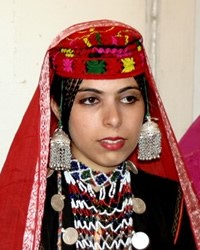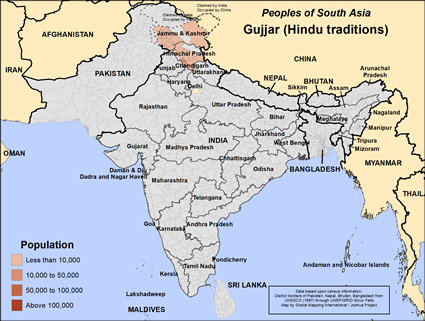The Hindu Gujjar people, primarily found in the northern states of India, including Jammu and Kashmir, Himachal Pradesh, and Uttarakhand, trace their origins to a pastoralist background. Historically, the Gujjar have been known as nomadic herders, moving with their livestock across the mountainous regions in search of grazing lands. Over time, many Hindu Gujjar settled into more permanent communities, though some still maintain a semi-nomadic lifestyle. Their history reflects a deep connection to the land and livestock, which remains central to their identity.
The lives of the Hindu Gujjar revolve around livestock herding, particularly cattle and buffalo. Many still lead semi-nomadic lives, moving their animals seasonally to find suitable grazing lands. In settled communities, agriculture plays a larger role, with families cultivating crops such as wheat, maize and rice.
The Gujjar people live in extended family units, often in rural or mountainous areas. Their houses are typically constructed from locally available materials like mud and wood, and villages are often spread out, reflecting their pastoral roots. Community life is tight-knit, with strong social bonds that emphasize family, hospitality, and mutual aid.
The Hindu Gujjar people follow Hinduism, blending it with traditions from their pastoralist heritage. They revere gods like Shiva and Krishna, often associating them with aspects of nature and livestock, which are central to their way of life. Rituals related to cattle are common, and festivals such as Diwali and Holi are widely celebrated within their communities. Many Gujjar also maintain spiritual practices related to ancestor worship, believing that the spirits of their forebears continue to watch over their families and livestock. Though some practices have evolved with modernization, their traditional beliefs remain a strong influence on their daily lives.
The Hindu Gujjar people face a range of challenges, particularly due to their semi-nomadic lifestyle and remote locations. Access to education is limited, with many Gujjar children unable to attend school regularly, especially in nomadic families. Healthcare is also a significant concern, as many Gujjar communities lack access to medical facilities, leaving them vulnerable to disease and poor living conditions. Economic opportunities are constrained, with many still relying on traditional herding practices that provide only a subsistence-level income. Development programs that focus on improving access to education, healthcare and sustainable economic opportunities—while respecting their cultural practices—are essential for the Hindu Gujjar people.
Pray for the Holy Spirit to move among Hindu Gujjar family and community leaders to seek his face and enjoy his blessings.
Pray for the Lord to thrust out workers who will be compelled to nurture a movement to Christ among the Gujjar people.
Pray that soon the Gujjar people will have faith that will lead them to live honorable lives that will draw others to the savior.
Scripture Prayers for the Gujjar (Hindu traditions) in India.
Ethnologue: Languages of the World
Reports from Indian NGOs on nomadic communities
Academic research on the Gujjar people and their pastoralist traditions
| Profile Source: Joshua Project |











